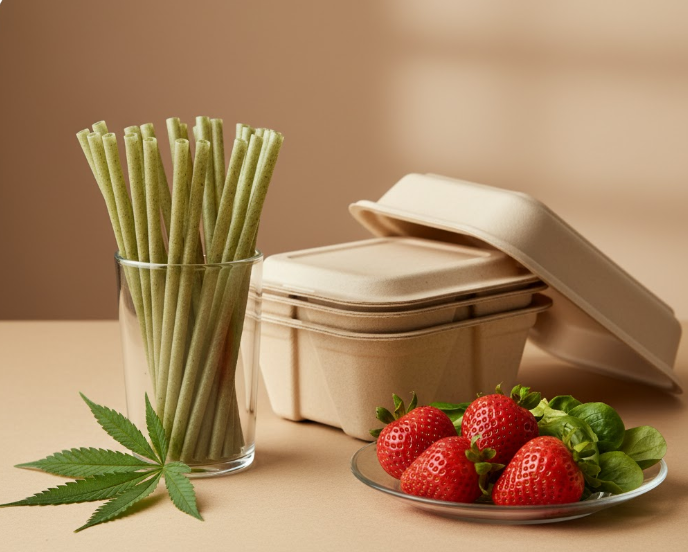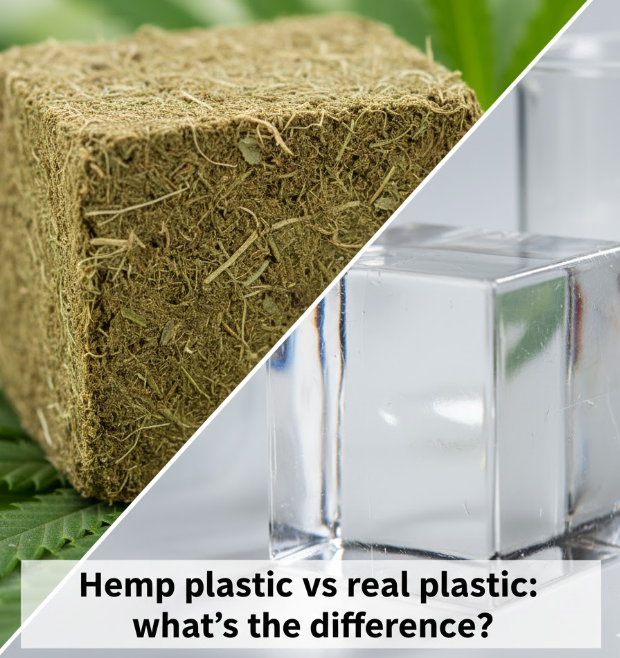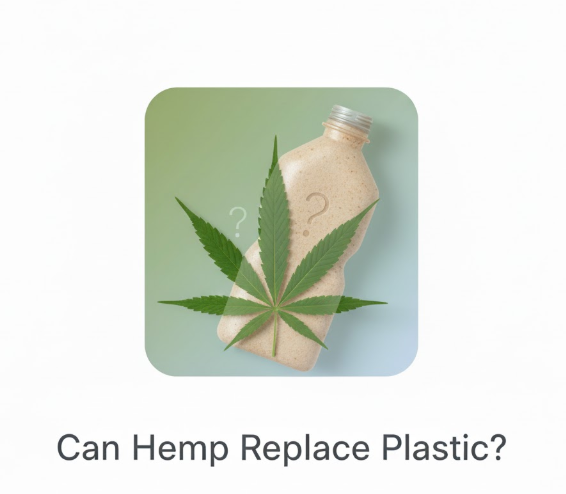Hemp Plastic Straws and Food Containers: Are They Safe & Worth It?
One thing that’s obvious to everyone today is that a lot of businesses today label themselves as green. Big name international brands (which also trade in India), such as IKEA and H&M are included. Sometimes, they are also called out for a marketing malpractice called ‘greenwashing’.
For businesses and celebrities, this is an easy way to get publicity and boost sales. Add an eco-friendly tag and watch the stock prices rise, whether it’s a brand or an influencer.
So now when you hear about hemp plastic straws and hemp food containers, it is easy to question its worth.
Are hemp plastic straws actually free of plastic?
Are zero-plastic straws and food containers safe for use?
Do they affect the food/liquids that touch them?
Is it worth making the switch to hemp plastic straws?
So in this guide I’ll explain to you what hemp plastic is, how hemp plastic straws and hemp food containers are made, and most importantly whether or not they are safe for users and the environment.
With that, I hope you’ll be able to find an answer to the original question yourself.
What Exactly Are Hemp Plastics (From Which Hemp Straws Are Made)?
Before we talk about sustainable food packaging items like hemp straws and food boxes, let’s understand what hemp plastic means.
Please try to imagine the strong fibers of the hemp plant (they are so strong that our ancestors used them for ropes and clothes). Now, what if we used the fibers to a cup, a straw, or a food box that looks and feels like the plastic straws and boxes we are so used to, but is actually biodegradable.
The power of hemp is its cellulose, which is a natural polymer that forms the building block of the plant. When we extract and process this cellulose, we can mold it into everyday items.
What we get, then, are items like straws and food plastics which look and feel and work the same as plastic straws and food boxes, but they’re not made from plastic.
The key difference between traditional and hemp plastic (which is technically called a bioplastic) is that instead of lasting hundreds of years, hemp plastic can decompose naturally, within months under the right conditions.
Source: Hemp Foundation
So, to be able to make plastic-free straws and food boxes is not a fantasy. We can already do it in labs, and more importantly, in fields and factories.
That’s why hemp straws and hemp food boxes are so easily available now.
Are Hemp Plastic Straws and Containers Safe?
Let’s start with what hemp straws and hemp food boxes are not.
- They’re not toxic.
- They’re not made from fossil fuels.
- And they don’t release harmful chemicals into your food or drink.
This is very different from how plastic straws and food boxes work.
Let’s understand why.
Traditional plastics like polypropylene or polystyrene leach microplastics and chemicals when they are exposed to heat or acidity. You might not taste it, but microplastic will enter your body.
That is why there is so much interest in better, safe, sustainable options of food storage and packaging.
Sustainable food packaging materials made from hemp are 100% plant-based. They are free from BPA, phthalates, and other synthetic additives. So there’s nothing harmful that gets your food or liquid through them.
That said, the safety of items like hemp straws also depends on how they’re made.
If a hemp straw is made from a pure hemp composite with natural binders, then it is completely food-safe. But if a manufacturer mixes in petroleum-based plastic to cut costs, you lose that purity.
So yes, hemp plastics are safe, as long as they’re genuinely bio-based and certified.
This is why transparency and vendor choice matters.
Are Hemp Straws and Hemp Food Boxes Really Eco-Friendly?
This is where hemp plastics truly shine.
Hemp grows fast, absorbs large amounts of CO₂, and needs almost no pesticides. It enriches the soil instead of depleting it. When used to make bioplastics, it turns into what we call a ‘closed-loop material’, one that can safely return to the earth.
Compare that with single-use plastic.
We’ve all seen the videos of turtles choking on straws and birds dying with bellies full of plastic. Those straws you used for ten minutes will outlive you, your children, and your grandchildren.
Hemp plastics, when composted properly, disappear into the soil in 3 to 6 months. No toxins, no residue, no guilt. That’s what I call a real revolution.
Are Hemp Straws and Hemp Food Boxes Durable Enough For Regular Use?
Yes. Let’s understand why.
Hemp fibers are incredibly strong. They’ve been used in ship ropes, army uniforms, and even car panels by companies like BMW.
When we blend these fibers with natural polymers, we get a bioplastic that we can use to make containers and straws that are sturdy, heat-resistant, and long-lasting.
Of course, they won’t last for centuries though. And that is the point.
Durability should not mean immortality. It should mean serving the purpose efficiently. Once that’s done, hemp-based biodegradable food packaging goes back to nature gracefully.
That’s how hemp plastic straws and hemp food containers are designed. They perform well when you need them and decompose when you’re done.
What About the Cost of Hemp-Based Eco-Friendly Food Packaging Materials?
This is the part most people hesitate to talk about.
Hemp-based products can be slightly more expensive right now. That’s because the infrastructure for hemp processing is still developing.
But this is exactly how change starts.
Solar panels were once costly too.
So were electric cars.
The more we adopt, the more affordable they become. And if the true cost of plastic pollution were considered (including the cost of cleaning oceans, landfills, and the air we breathe) then hemp would already seem like the cheaper choice.
The bottom line is that even now, when you buy a hemp product, you’re not just buying an item. You’re investing in a cleaner system, in farmers, and in innovation that will eventually bring prices down for everyone.
So, Are They Hemp Plastic Straws and Hemp Food Containers Worth It?
Let me answer this not as an entrepreneur but as someone who has walked through villages where plastic waste clogs the water streams.
Yes, they are worth it.
They’re worth it because they prove that we can enjoy convenience without destroying what sustains us. They’re worth it because they turn agricultural waste into opportunity.
And they’re worth it because every hemp straw you use is one less piece of plastic that ends up suffocating our planet.
Change never starts big. It begins with small, quiet choices like switching to eco-friendly packaging materials. When millions of people make that small change, the world tilts toward hope.
A Personal Note
I’ve spent the better part of my life chasing one single idea: Business can be a force for good. Not the kind of good you write in CSR reports, but the kind that leaves the soil richer, not poorer. The kind where the people stand with dignity in their hearts.
A few years ago, when I started working with hemp farmers in Uttarakhand, I didn’t know this humble crop would end up becoming one of the most promising answers to our plastic problem. Back then, we were focused on livelihood and empowerment. Today, the same plant that gave women farmers a second chance at income is giving the planet a second chance at healing.
Source: Hemp Foundation
When I started, people told me bioplastics were just a trend. They said hemp was too complicated, too unconventional, too idealistic. I didn’t argue. I just kept walking.
Why? Because I’ve seen what this plant can do. I’ve seen women in the mountains hold their first steady income because of hemp. I’ve seen students light up when they realize innovation can grow in the soil, not just in Silicon Valley.
And now, as I sit inside our Hemp Studio writing this, I’m holding a hemp straw. It’s light, smooth, and it feels like the future. Not the distant one we dream of, but the near one we can build together. One meal, one product, one choice at a time.
So yes, hemp plastic straws and containers are safe. They’re worth it. And they’re a small but powerful way of saying, “We’re done waiting. We’re ready to fix what we broke.”
FAQs
1. Are hemp plastic straws safe for daily use?
Yes, hemp plastic straws are safe. They don’t leach harmful chemicals and are heat-resistant, which makes them a healthier choice than petroleum-based or paper straws.
2. Can hemp food containers hold hot food or drinks?
Absolutely. Hemp food containers can handle heat well without releasing toxins, unlike regular plastic. They’re strong, stable, and suitable for both hot and cold items.
3. How long does hemp plastic take to biodegrade?
Under done right, hemp-based compostable food packaging can break down in 3 to 6 months. In natural environments, the process takes longer, depending on temperature and moisture.
4. Are hemp plastic products more expensive than regular plastic?
Currently, yes. Sustainable food packaging made from hemp, will cost more due to limited production and processing infrastructure. However, prices will drop as demand and technology scale up globally.
5. Can I compost hemp plastic straws at home?
You can, but results vary. Compostable food packaging made from hemp composts faster in industrial facilities. At home, they’ll still degrade, just more slowly depending on temperature and soil quality.
Vishal Vivek
Vishal Vivek is the Founder and CEO of Ukhi, a pioneering bio-materials company dedicated to ending plastic pollution by converting agricultural waste into high-performance compostable polymers. With a background in sustainable entrepreneurship and over a decade of technology experience, he leads Ukhi’s vision to create scalable, planet-positive material solutions. Previously, Vishal founded the Hemp Foundation, where he empowered more than 1,000 farmers and advanced sustainable livelihood initiatives. His work has been recognized through awards such as the HDFC Parivartan Grant and featured in leading publications like Forbes and Entrepreneur. Times Group recognized him as a legendary entrepreneur and published his biography in “I Did IT- Vol 2” alongside social pioneers like Bindeshwar Pathak (Sulabh International) and Anshu Gupta (Goonj). Vishal has authored more than 200 articles on sustainability and hemp, reflecting his deep expertise and advocacy for regenerative solutions. His commitment to grassroots impact led him to live in the remote mountains of Uttarakhand, where he immersed himself in the lives of marginal farmers, understanding their challenges and co-creating economic opportunities through hemp-based initiatives. A deeply passionate innovator, Vishal often draws inspiration from seemingly impossible achievements: “If Elon Musk can make rockets reusable, or Dashrath Manjhi can carve a path through a mountain with rudimentary tools, why can’t we eliminate the demon of single-use plastic while uplifting struggling farmers? We will make it happen—whatever it takes.” Ukhi is proud to be supported by premier institutions including IIT Guwahati, NSRCEL-IIM Bangalore, Indian School of Business (Hyderabad), Indian Council of Agricultural Research (ICAR Pusa), and the Indian Institute of Packaging. Vishal is committed to demonstrating that business can be a powerful catalyst for global environmental and social good. Connect with Vishal Vivek
Related Posts
Hemp Plastic vs Regular Plastic: What’s the Real Difference?
If I say that you’ll find plastic cups and straws floating in the holiest of rivers of India, I’
Can Hemp Replace Plastic? What Science and Experts Say
A recent study has shown just how much the youth values sustainability. Nearly three-quarters (
How is Cotton Contributing to Climate Change?
Under the microscope: Green Houses Gases of the Cotton Industry Cotton is killing the climate.




